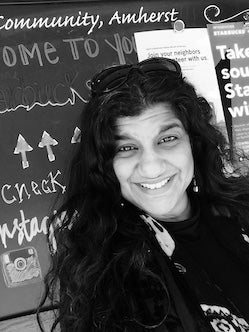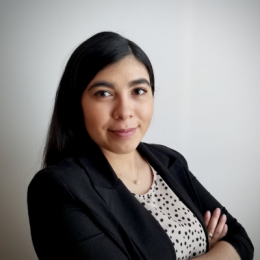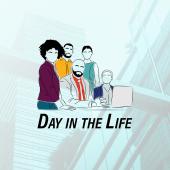
Nishat Ruiter
General Counsel
TED Conferences, LLC
Nishat Ruiter, general counsel of the nonprofit TED Conferences, LLC, first became familiar with the organization in 2006. That was the year that TED posted online its first TED Talks — influential videos (18 minutes or less) by expert speakers on education, business, science, technology, and creativity. Her husband Pieter, a Dutch native, introduced her to them. “My husband is a writer, and he was tracking TED from the beginning. At the time, he was an avid follower of [the English musician and producer] Brian Eno and some incredible thinkers of the Long Now Foundation who were driving interesting concepts and solutions from a global and creative perspective,” she remembers. Within three months of becoming available, the first six TED Talk videos garnered more than one million views.
As a result of the inspiring impact of TED Talks, Ruiter and her husband began discussing TED Talks with friends and family. “We would have get-togethers at our house where we would discuss the concepts from TED Talks with them,” she explains. “In one scenario, we discussed misconceptions of poverty and the common stereotypes that are held, despite the data. This is when we showed our babysitter, who was a junior in high school, the TED Talk from Hans Rosling, ‘New Insights on Poverty,’ from 2007. She showed it to her entire junior class and later ended up studying journalism in college. We were all very excited, because these ideas were impacting people immediately, which is incredible. They helped you reframe your notions about so many things.” The free media platform surpassed one billion video views in 2012. Currently, TED Talk videos average 17 new pageviews per second.
TED’s origins
TED’s story begins in 1984. It started as a small California conference known as Technology, Entertainment, and Design — the original meaning of TED. Since then, the nonprofit, headquartered in New York and Vancouver, has grown into a global community devoted to sharing ideas and knowledge on various disciplines in over 100 languages. Over the past 35 years, the organization has created a myriad of programs, including the flagship TED Talks and conferences, TEDx, TEDWomen, TED Salons, the TED Fellows program, the Audacious Project, TEDSummit, TED-Ed, and various original podcasts, including The TED Interview curated by Chris Anderson, Sincerely, X, and WorkLife with Adam Grant.
In 2015, Ruiter moved from hosting monthly devotional gatherings called Spiritual Café, which delved into topics related to how people are all connected, to helping organize an official TEDx event in Hillsborough, New Jersey. She and other organizers worked for six months on curating local speakers and helping them cultivate their TEDx Talks. The talk brought the community together around the theme “Change Matters.” The experience required obtaining a license from TED, giving Ruiter a taste of TED’s process and “what it takes to put on a mini, micro-TED event in your own community.” Months later, she would land an interview to become TED’s first general counsel.
The path to TED
Ruiter is the daughter of Pakistani immigrants. Her father was a civil engineer and her mother worked in retail. Growing up, she was encouraged to study medicine or the sciences. “I think my childhood was disassociated from the idea of law school because I didn’t have a lot of exposure [to the law] — I didn’t have any family members who were lawyers,” she reflects. It wasn’t until college that Ruiter first considered pursuing a career in law. During a class that she took as an elective, called the Legal and Social Environment of Business, the professor presented a hypothetical legal case: A student slips on a banana peel at school and sues the school. When the class was asked who would represent the student, everyone volunteered. But only one student wanted to represent the school: Ruiter. “I wanted to find the reasons that their side could be defended, to explore the issues and analyze it in different ways. But the best part was creating a solution to fix the problem, through advocacy and organization of the evidence. That was very exciting for me and tapped into my love of acting — which had created a palpable sense of empathy in me early on.” This was her first indication that a legal career could be for her. After graduating from Rutgers University, Ruiter earned a law degree at Widener University School of Law in Delaware.
Attending law school not only solidified her passion for law, but it also inspired Ruiter’s belief in the connection between law and empathy. “I think advocacy connected the idea of being empathetic to issues and seeing them from another person’s perspective,” she says. This core tenet, combined with regular participation in debate and mock negotiations as president of the Moe Levine Honor Society, led Ruiter to pursue litigation after law school.
She began as a matrimonial litigator in Brooklyn. However, she often felt that even with the best client, the most favorable case law, and the best evidence, the system was too overcrowded and even seemed arbitrary. “You have maybe three minutes to argue a motion in front of a judge. Sometimes, you lose because the judge is in a bad mood. That was something that really got to me,” she recalls.
Despite ultimately deciding that litigation was not for her, Ruiter learned valuable lessons: staying curious and learning in all situations. “What I found in the field at the time were lawyers who seemed to use the same playbook that they had for years, with very little change or creativity. I never wanted to be stagnant. That’s the quality that I feel is so important for a lawyer in any field to retain. You have to be learning constantly.”
This skill became especially important during Ruiter’s decade-long tenure as in-house counsel at CA Technologies (formerly Computer Associates), one of the largest independent software corporations in the world (recently acquired by Broadcom). She joined at an interesting time for the organization: It had just been handed a deferred prosecution agreement (DPA) for criminal actions regarding backdating contracts to meet revenue targets. Ruiter was unsure if she should take the position as in-house counsel, given the legal cloud over the company. She consulted one of her mentors, who was the general counsel of Chubb Corporation, and was encouraged to pursue the job because the DPA presented a unique opportunity for the legal department to enhance the ethics of the company, which would welcome strategic legal advice on how to improve. The advice helped Ruiter not only to steer CA through a difficult period, but also to learn with the executives on the journey, as part of the company’s team.
CA proved to be a stimulating environment for Ruiter. Serving as vice president and associate general counsel, she worked with 150 lawyers with specialized expertise, overseeing their own regions. She recalls their cross-departmental meetings fondly. “I learned so much about what everyone was engaged with. Here are the best and the brightest talking about what they’re really going through in the field.” At CA, Ruiter had access to many different areas of the business, along with a close-knit team whose members supported each other and were dedicated to finding the best solutions for the company. This experience proved invaluable to her, she says, and laid the foundation for the collaborative philosophy she implements at TED.
Ruiter is currently part of a very lean legal team at TED. Because of this, she relies heavily on TED team members in other departments to understand and advocate on behalf of the legal team when red flags appear. “I honestly feel like every person in TED is part of a legal frontline,” she opines. Ruiter has developed training programs and educational materials on a wide variety of subjects from privacy, compliance, and code of conduct, to issues on contracts, copyright clearance, reviewing slides for speakers, and more. She prioritizes explaining the “why” behind certain legal procedures so that her colleagues can advocate for the purposes and principles behind the work they do. A result is that professionals outside the legal department can spot red flags, and are equipped to handle them. “Their advocacy and ability to work on the frontline amaze me. I’ve never been so impressed with people just holding up the legal flag and saying, ‘Now that we know how to do this, we’re going to do it.’” She cautions that of course, nothing is “all roses” all the time, but that “everyone is part of the team, and trying hard to do what they can.”
While it might be surprising that Ruiter is the first in-house counsel employed at TED, it’s an intentional choice that matches Ruiter’s non-traditional general counsel role. During her interview process in 2016, Ruiter explained to TED’s senior management that she sees the role of general counsel as being dynamic, and one that should align with the TED voice — adding a level of authenticity — and conveying the TED approach to everything from agreements, to representing the business, to ensuring a meaningful code of compliance.
A simple example on leading with authenticity and transparency, she says, is her company’s response to the General Data Protection Regulation (GDPR). TED’s website explains its privacy policy and what they’ve done to address GDPR in a clear manner.
Ruiter ensured that the language was clear and easy to understand. Next to each paragraph, there is an italicized two-sentence description that explains the context. Similarly, during any contract negotiation, she aims to define her contracts with more meaning and context, but less “legalese.” Ruiter says it’s a lesson she learned from litigation: “Represent the context of the deal. Otherwise, judges will assume what’s missing. It’s essential to craft language that’s unique and appropriate for that situation, and not to simply rely on precedent. Don’t just cut and paste. Think about what you’re doing.”
Ruiter also applies an authentic lens to the issue of diversity in the legal field. Ruiter was a signatory to an open letter by 170 US general counsel that called for law firms to retain outside counsel that reflect the diversity of the legal community, and the companies and customers it serves. When working with outside counsel at TED, Ruiter makes sure to have a conversation about what they’re doing in their work environments to make diversity a priority. Her personal view is captured in Mellody Hobson’s 2014 TED Talk: “Be Color Brave, Not Color Blind.” Hobson argues that organizations are more successful when they are diverse. “If you only hire people that are like you, or have similar life experiences and similar exposures, you’re not going to find the best answer. I am a firm believer in that.” Ruiter’s belief in diversity also stems from her religion. “I’m Baha’i, which is a religion that is centered around the concept that humanity is one, and that we’re all interconnected as people,” she says. This perspective has impacted almost everything that Ruiter does, from working with outside counsel to managing her internal teams and hiring candidates at TED. Ruiter emphasizes that by having a variety of cultural representations and perspectives during decision making, you are privy to wisdom that you would not gain otherwise.
Bringing as many diverse perspectives together as possible, Ruiter formed an internship program between TED and the Master of Law program at Fordham University School of Law in New York. Through it, she has been able to welcome lawyers from Russia, the Philippines, England, Korea, Belgium, and other parts of the world.
In addition to increasing diversity at TED, Ruiter is focused on responding to TED’s rapid global growth across many different platforms. “TED has so many different ways of sharing ideas, so from a legal perspective, finding the right legal solution is challenging. Negotiating a TV series with a major network in India will be different from reviewing host agreements for our podcasts,” she says. This is also distinct “from creating a customer-facing license agreement for a new product we are launching called TED Masterclass that teaches how to surface new ideas to develop a TED-style talk. Given the variety of content, ensuring that legal issues are addressed in a meaningful way is challenging but never boring.” One trusted solution she relies on is working with people who have the expertise that you need.
“What I really enjoy is figuring out a solution with multiple stakeholders in the room, whether they are contract managers, the business development team, sales, or other the lawyers I’m working with, such as outside counsel. We discuss the issue at hand. We explore what the problem is. We look at it from all sides,” she says. During these brainstorms, Ruiter finds that the final solution is typically based on the alchemy that happens from multiple insights and ideas offered: “It drives wisdom that can only be reached after a diverse clash of opinions.” This solution-driven process of consultation is a big part of how Ruiter conducts day-to-day meetings. She understands that while sometimes speaking your mind can be stressful, if you keep the tone creative, fun, and non-threatening, the best ideas will emerge.
In order to create a positive environment for idea-sharing, Ruiter prioritizes a bottom-up approach to leadership. She encourages and empowers people to make their own decisions. It helps to cultivate personal relationships with subordinates. “You realize that every person has his or her motivations, and desires, and reasons why they’re doing things,” she believes. “It’s good to give them room to build upon that on their own and to accept the diversity of approach and style.” Building on this foundation, Ruiter stresses that collaboration is more organic and productive.
After three years with TED, Ruiter still considers the position “a dream of a dream of a dream.” Being surrounded by people who are passionate about the power of ideas to change attitudes, lives, and the world, both aligns with her own beliefs and inspires her: “That’s what I mean by authentic. The work has to connect to the heart.”
Getting to know… Nishat Ruiter
IF YOU HOSTED A TED TALK, WHAT WOULD ITS SUBJECT BE?
A TED Talk that I’d love to see, but that I wouldn’t necessarily want to host, would be on how the legal field should encompass authenticity and ethics. The law should not just be about rules, and it should not be just about lawyers. It should be much more intertwined with ethics and authenticity.
YOU MENTIONED THAT YOU LIVED AND STUDIED IN THE NETHERLANDS AFTER LAW SCHOOL. WHAT WAS ONE OF THE BEST PARTS OF LIVING AND STUDYING THERE?
I loved the walking lifestyle of the Dutch city of Utrecht, which was cozy and so comfortable. Nothing seemed too rushed or stressed — it was calm. I also adored the conversations with friends over coffee, either at home or at cafés — a common daily occurrence that just made everything nicer, relatable, and engaging.
WHAT DOES A TYPICAL WEEKEND LOOK LIKE FOR YOU?
Between catching up with reading, attending the local plays in Princeton, and watching epic TV series with the kids, our weekends typically contain activities aimed at building the social fabric in our community. We will either be hosting a Spiritual Café, inviting folks over to share meditations and listen to inspiring music, or preparing breakfast with community stakeholders to discuss new ways to bridge differences in our town.




